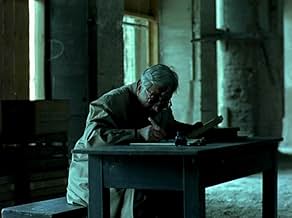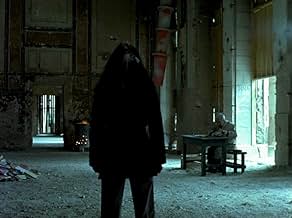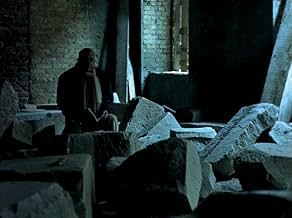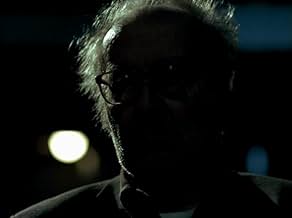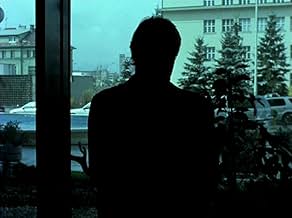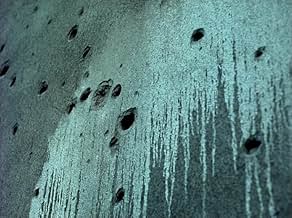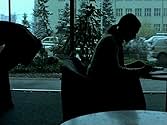IMDb RATING
6.8/10
3.3K
YOUR RATING
An indictment of modern times divided into three "kingdoms": "Enfer" ("Hell"), "Purgatoire" ("Purgatory") and "Paradis" ("Paradise").An indictment of modern times divided into three "kingdoms": "Enfer" ("Hell"), "Purgatoire" ("Purgatory") and "Paradis" ("Paradise").An indictment of modern times divided into three "kingdoms": "Enfer" ("Hell"), "Purgatoire" ("Purgatory") and "Paradis" ("Paradise").
- Awards
- 1 win & 6 nominations total
- Director
- Writer
- All cast & crew
- Production, box office & more at IMDbPro
6.83.2K
1
2
3
4
5
6
7
8
9
10
Featured reviews
well intentioned but lacks depth (even though it seems the opposite)
It is sometimes hard for creative and well meaning filmmakers to accept the fact that their political and philosophical understanding of the world might not be as rounded as their movie making skills. Godard shows in this excruciating film that he clearly falls into this category of filmmakers. 'Notre Musique' is well intentioned, for sure. Godard seeks to obfuscate the lines between reality and drama, the sensible and the absurd (heaven guarded by US marines). In doing so, however, the film becomes Godard's 'international politics explained' more than an engaging piece of cinema. Being a visual medium as it is, cinema needs to add layers of subtlety to what's seen (so that we look beyond that which is seen), in order to be not only an effective messenger but also an exercise in self-exploration. 'Notre Musique' is a blaring loudspeaker with Godard in control of the microphone.
Godard at his most responsible as an artist
When you go on holiday, do you ever say, "Oh Look! Look at that"? How does sharing it make it different for us? How is the experience lessened when we don't have another person there?
A scientist measures position and momentum of a particle, but no matter how accurate the measurements, there is always an uncertainty in the results. This Nobel Prize theory is known as 'Heisenberg's uncertainty principle' and has profound implications for physics and philosophy. (At the atomic and sub-atomic level, an act of observation noticeably affects what is being observed.)
Godard mentions Heisenberg through one of his (Heisenberg's) anecdotes. Godard's main interest is funnelled through the cinematic device of shot/reverse angle shot. He examines how it can enlarge understanding of deeper issues. In Notre Musique, Godard is protagonist not for political ideology or social comment. He is flag-bearer. For film. For poetry. For film-as-poetry. Like Maya Deren in her copious writings on cinematic theory, he shoulders the burden of artist-filmmaker with all seriousness, proffering a new language. A different way to view the world. He becomes the lens. We make it our camera.
"Heisenberg and Bohr," he says, "were walking in the Danish countryside, talking about physics. They come to Elsinore Castle. The German scientist said, 'Oh, there's nothing special about this castle.' The Danish physicist said, 'Yes, but if you say, "Hamlet's Castle," then it becomes special.'
Godard stars as himself in this mix of documentary, fiction and montage. He is speaking about on text and image, at the European Literary Encounters Conference in Bosnia. In the Heisenberg story, 'Hamlet's Castle' becomes a literary 'shot/reverse shot.' Godard concerns us with the power of romanticism. His takes on Israeli-Palestinian conflict are refreshingly non-judgemental. Notre Musique calls for a revolution of creative force, "that reinforces memory, clarifies dreams and gives substance to images." Continuing his discourse on the power of the 'real' and the 'poetic,' Godard explains how, "the Jews become the stuff of fiction: the Palestinians, of documentary." (Look at the cinematic output of both, and how Palestinians are defined largely in relation to Israel.)
One storyline concerns two young girls visiting Sarajevo – a place 'where reconciliation seems possible.' Judith is an Israeli journalist. She interviews, among others, Palestinian intellectual and celebrated poet, Mahmoud Darwich. (In Darwich's work, Palestine becomes a metaphor for the loss of Eden, for birth and resurrection, and for the anguish of dispossession. As with Heisenberg, this contextual reference is not explained in the film itself. Understanding them is not essential but does enrich the enjoyment of Notre Musique. ) Also at the Encounters is Olga, a Jewish-French student of Russian descent. She videos Godard's lecture and tries to give him a copy. In some ways, she is an alter-ego, a 'shot/reverse shot' of Judith.
The concept of dialogue (in a non-verbal sense) is developed as Godard critiques 'shot/reverse shot' as part of his lecture. This cinematic device, usually used when two people are talking to each other, reverses the camera so we see each person seemingly from the other's viewpoint as they speak. The angle provides a mental continuity for us, even though both people are not on screen together. The actual change in camera angle, now a convention, is not really 180 degrees but anything from 120 to 160. The person is slightly offset, rather than directly facing the camera (which would also appear more confrontational).
Notre Musique is one of Godard's most responsible, articulate and accessible works. Which makes it doubly shameful that many critics failed to expend the minimal energy required to engage with it, preferring instead to give a banal description that belies their clocking-on superficiality, and usually finishing with a self-satisfied dismissal by 'cleverly' observing that Godard has slightly misquoted something or that his ideas are too hard to follow. As if that mattered. (A more mature analysis was given by BFI writer Michael Witt who said the film, "functions simultaneously as a bulwark against the tyranny of received ideas and as a laboratory for the generation of fresh perspectives.") Notre Musique is structured into a somewhat artificial triptych of Hell, Purgatory and Heaven. The first covers the horrors of war through the ages up to the present. The second, mental scars left on survivors. The brief 'heaven' follows what might probably have been part two's tragic conclusion (related by a disembodied voice over a phone at the end of the second act). Cinematography and editing have all of Godard's hallmark crispness. Some of the subtitling is sloppy, even misspelling Bohr's name (something that will irritate adherents of form over substance).
A glimpse of a penguin near the beginning gives it an almost anthropological tone, man portrayed as obsessively armed for the extermination of his own kind. Descending from the 'age of fable,' the hollowness of popular morality is hinted at briefly. A woman on her knees beseeches a soldier. The Lord's Prayer is quoted, "Forgive us our trespasses, as we forgive those who trespass against us." Irony is underlined in a refrain, "As we forgive them, and no differently," which is twice repeated. It is not a song that has carried much weight against war. Can the music of artists and poets do any better? Recently I watched a multiplex trailer for 'this summer's movies.' It asked, and 'answered' everything I supposedly 'want' from films. Thrills. Excitement. Explosions. Laughs. Being whisked off to an imaginary world. And so on. I listened to the end of the list waiting in vain for something like, "being mentally stimulated." If you are also unsatisfied by the surfeit of cinematic trash that puts your brain on hold, this film might be for you. If, however, like the critics who simply rate it against competing blockbusters and find it lacking, you maybe do not wish to exercise any of those mental muscles then, like this humble review, it will not be the welcome sunbeam that makes or doesn't make your summer.
A scientist measures position and momentum of a particle, but no matter how accurate the measurements, there is always an uncertainty in the results. This Nobel Prize theory is known as 'Heisenberg's uncertainty principle' and has profound implications for physics and philosophy. (At the atomic and sub-atomic level, an act of observation noticeably affects what is being observed.)
Godard mentions Heisenberg through one of his (Heisenberg's) anecdotes. Godard's main interest is funnelled through the cinematic device of shot/reverse angle shot. He examines how it can enlarge understanding of deeper issues. In Notre Musique, Godard is protagonist not for political ideology or social comment. He is flag-bearer. For film. For poetry. For film-as-poetry. Like Maya Deren in her copious writings on cinematic theory, he shoulders the burden of artist-filmmaker with all seriousness, proffering a new language. A different way to view the world. He becomes the lens. We make it our camera.
"Heisenberg and Bohr," he says, "were walking in the Danish countryside, talking about physics. They come to Elsinore Castle. The German scientist said, 'Oh, there's nothing special about this castle.' The Danish physicist said, 'Yes, but if you say, "Hamlet's Castle," then it becomes special.'
Godard stars as himself in this mix of documentary, fiction and montage. He is speaking about on text and image, at the European Literary Encounters Conference in Bosnia. In the Heisenberg story, 'Hamlet's Castle' becomes a literary 'shot/reverse shot.' Godard concerns us with the power of romanticism. His takes on Israeli-Palestinian conflict are refreshingly non-judgemental. Notre Musique calls for a revolution of creative force, "that reinforces memory, clarifies dreams and gives substance to images." Continuing his discourse on the power of the 'real' and the 'poetic,' Godard explains how, "the Jews become the stuff of fiction: the Palestinians, of documentary." (Look at the cinematic output of both, and how Palestinians are defined largely in relation to Israel.)
One storyline concerns two young girls visiting Sarajevo – a place 'where reconciliation seems possible.' Judith is an Israeli journalist. She interviews, among others, Palestinian intellectual and celebrated poet, Mahmoud Darwich. (In Darwich's work, Palestine becomes a metaphor for the loss of Eden, for birth and resurrection, and for the anguish of dispossession. As with Heisenberg, this contextual reference is not explained in the film itself. Understanding them is not essential but does enrich the enjoyment of Notre Musique. ) Also at the Encounters is Olga, a Jewish-French student of Russian descent. She videos Godard's lecture and tries to give him a copy. In some ways, she is an alter-ego, a 'shot/reverse shot' of Judith.
The concept of dialogue (in a non-verbal sense) is developed as Godard critiques 'shot/reverse shot' as part of his lecture. This cinematic device, usually used when two people are talking to each other, reverses the camera so we see each person seemingly from the other's viewpoint as they speak. The angle provides a mental continuity for us, even though both people are not on screen together. The actual change in camera angle, now a convention, is not really 180 degrees but anything from 120 to 160. The person is slightly offset, rather than directly facing the camera (which would also appear more confrontational).
Notre Musique is one of Godard's most responsible, articulate and accessible works. Which makes it doubly shameful that many critics failed to expend the minimal energy required to engage with it, preferring instead to give a banal description that belies their clocking-on superficiality, and usually finishing with a self-satisfied dismissal by 'cleverly' observing that Godard has slightly misquoted something or that his ideas are too hard to follow. As if that mattered. (A more mature analysis was given by BFI writer Michael Witt who said the film, "functions simultaneously as a bulwark against the tyranny of received ideas and as a laboratory for the generation of fresh perspectives.") Notre Musique is structured into a somewhat artificial triptych of Hell, Purgatory and Heaven. The first covers the horrors of war through the ages up to the present. The second, mental scars left on survivors. The brief 'heaven' follows what might probably have been part two's tragic conclusion (related by a disembodied voice over a phone at the end of the second act). Cinematography and editing have all of Godard's hallmark crispness. Some of the subtitling is sloppy, even misspelling Bohr's name (something that will irritate adherents of form over substance).
A glimpse of a penguin near the beginning gives it an almost anthropological tone, man portrayed as obsessively armed for the extermination of his own kind. Descending from the 'age of fable,' the hollowness of popular morality is hinted at briefly. A woman on her knees beseeches a soldier. The Lord's Prayer is quoted, "Forgive us our trespasses, as we forgive those who trespass against us." Irony is underlined in a refrain, "As we forgive them, and no differently," which is twice repeated. It is not a song that has carried much weight against war. Can the music of artists and poets do any better? Recently I watched a multiplex trailer for 'this summer's movies.' It asked, and 'answered' everything I supposedly 'want' from films. Thrills. Excitement. Explosions. Laughs. Being whisked off to an imaginary world. And so on. I listened to the end of the list waiting in vain for something like, "being mentally stimulated." If you are also unsatisfied by the surfeit of cinematic trash that puts your brain on hold, this film might be for you. If, however, like the critics who simply rate it against competing blockbusters and find it lacking, you maybe do not wish to exercise any of those mental muscles then, like this humble review, it will not be the welcome sunbeam that makes or doesn't make your summer.
This one has to be seen
I've just come back from the cinema and it's raining very hard. But there's the sun, too, which is going down behind the mountains. It's very poetic. But not nearly as poetic as Jean Luc Godard's last film, "Notre Musique".
The movie is divided into three kingdoms: 1 - Enfer, 2 - Purgatoire and 3 - Paradis. The first part of the movie consists in a collage of various war images and situations accompanied by a wonderful music. Some very clever sentences are said off screen, too. "Death can be seen in two different ways: as the possible of the impossible or as the impossible of the possible". The second part shows us the crossed stories of some peoples meeting in Sarajevo for the Book Weeks: J. L. Godard himself, a young Israeli Journalist, a Palestinian and a Spanish poets, A young Hebrew girl with Russian origins, a Hebrew translator with Egyptian origins, some American natives, some natives of Sarajevo and other people speak about their experiences, they wishes, war, peace, poetry, history, life, death, cinema, reconciliation. J.L. Godard gives a lecture to some cinema students and shows them photographs. The third part takes place in paradise and shows us a girl who has been killed in a cinema by Israeli snipers who suspected her of being a terrorist ready to kill herself. She had a red bag with her and people thought it contained a bomb. In fact there were just books in it. The girl wanders near a river and encounters an American marine. Some boys are playing and reading books. Paradise is fenced and guarded by U.S. military forces.
This movie is truly amazing. In fact it is not just a film, it is poetry. In moments like these when cinema industry is dominated by fast, brainless, action-packed movies, it is a real pleasure and mind-freeing experience to see something that beautiful and poetic. This was presented this year in Cannes and didn't get much attention if I remember right. A journalist of "Le Nouvel Observateur" who usually gives very good advices, this time got it wrong saying that "Notre Musique" is a senile work. Not at all. It's the work of a director who has only improved with years and who has reached total serenity and great wisdom. This film does not give you ready-made, simple answers to common questions, it gives you some points which are incredibly interesting to develop and think about. Sarajevo is the ideal place where peoples, histories and cultures mix and sometimes sadly clash. When the young girl is asked "Why Sarajevo?" the touching answer she gives is "Because Palestine. I come from Tel Aviv and wanted to see a place where people can get along in harmony". There's so much to think about this movie. And everything is filmed so well, so limpidly, with such a mastery, you can't stop staring at the screen. "Godard is the only film director in the world" (Freddy Buache)
The movie is divided into three kingdoms: 1 - Enfer, 2 - Purgatoire and 3 - Paradis. The first part of the movie consists in a collage of various war images and situations accompanied by a wonderful music. Some very clever sentences are said off screen, too. "Death can be seen in two different ways: as the possible of the impossible or as the impossible of the possible". The second part shows us the crossed stories of some peoples meeting in Sarajevo for the Book Weeks: J. L. Godard himself, a young Israeli Journalist, a Palestinian and a Spanish poets, A young Hebrew girl with Russian origins, a Hebrew translator with Egyptian origins, some American natives, some natives of Sarajevo and other people speak about their experiences, they wishes, war, peace, poetry, history, life, death, cinema, reconciliation. J.L. Godard gives a lecture to some cinema students and shows them photographs. The third part takes place in paradise and shows us a girl who has been killed in a cinema by Israeli snipers who suspected her of being a terrorist ready to kill herself. She had a red bag with her and people thought it contained a bomb. In fact there were just books in it. The girl wanders near a river and encounters an American marine. Some boys are playing and reading books. Paradise is fenced and guarded by U.S. military forces.
This movie is truly amazing. In fact it is not just a film, it is poetry. In moments like these when cinema industry is dominated by fast, brainless, action-packed movies, it is a real pleasure and mind-freeing experience to see something that beautiful and poetic. This was presented this year in Cannes and didn't get much attention if I remember right. A journalist of "Le Nouvel Observateur" who usually gives very good advices, this time got it wrong saying that "Notre Musique" is a senile work. Not at all. It's the work of a director who has only improved with years and who has reached total serenity and great wisdom. This film does not give you ready-made, simple answers to common questions, it gives you some points which are incredibly interesting to develop and think about. Sarajevo is the ideal place where peoples, histories and cultures mix and sometimes sadly clash. When the young girl is asked "Why Sarajevo?" the touching answer she gives is "Because Palestine. I come from Tel Aviv and wanted to see a place where people can get along in harmony". There's so much to think about this movie. And everything is filmed so well, so limpidly, with such a mastery, you can't stop staring at the screen. "Godard is the only film director in the world" (Freddy Buache)
Our Music-2004: Poses unanswerable questions that fail to support the conclusion.
This is not entertainment...
I'd seen Contempt (1963) and Breathless (1960) many years ago and thoroughly enjoyed both. After 1964, I sort missed all that he directed until now, which appeared on late-night TV. And no wonder it was on so late at night...
It seems that, as many of us get older and maybe wiser, we like to expound on things philosophical. Bergman did it well, and without resorting to didactic circularity or confusion and still managed to tell a good story. Woody Allen uses satire brilliantly for the same purpose.
However, Godard here uses the bare bones of a simple, quasi-documentary style story and one that it episodically fractured and with much symbolism to reflect upon 'what it all means': that is, life, death and the whole damn thing. Using the current Israeli problem with Palestine and vice-versa, he explores the three concepts of Hell, Purgatory and Heaven, using each to show what humanity has done, what it's doing and where it should be going, respectively.
The first, Hell, is obvious: with a montage of cuts from a multitude of news and film clips, Godard shows us the extent to which we prey upon each other even as we pray for each other. So, there are some real all too real scenes of the dead, the dying and the executed during the many wars that have been documented during the last hundred years or so. Nothing new here at all...
The second, Purgatory (a place for waiting), is well an exposition about waiting: waiting for a bus, for a train, for a plane, for a meeting to start, for a bridge to be rebuilt, for a nation to recover from war, for people to begin to understand each other. And this is all done within the thin framework of the story of Olga (Nade Dieu), the Jewish journalist from Tel Aviv who is attending a lecture by Godard (playing himself) in Sarajevo, and who is trying to understand why human problems cannot seem to be resolved, no matter what. Significantly, by choosing just Olga, Godard has certainly brought his philosophy to a very personal level, and one with which we can all identify, more or less.
All of that is rendered moot when Olga appears to commit an unspeakable act when she returns to Tel Aviv. Perhaps Godard should have told her that it's not the end that matters but the journey to achieve that end?
The third the shortest vignette is our final destination: as a prisoner of Nature, complete with - American! - border guards who let Olga through to join the happy throng. Essentially: strip off civilization and return to our basics to find out who we really are...
I think I'll stick with tackling prejudice, reducing global warming and trying to make a positive difference rather than taking Olga's choice.
It's well filmed, as you'd expect from Godard; the music is, at times, quite beautiful to hear; and the Sarajevo mise-en-scene is a stark reminder of our collective sins. An annoying aspect for me, however, is that not all dialog was translated and subtitled; perhaps it wasn't necessary?
So, while interesting visually and aurally, I'd recommend this only for those who like to reflect upon existential problems within philosophy.
I'd seen Contempt (1963) and Breathless (1960) many years ago and thoroughly enjoyed both. After 1964, I sort missed all that he directed until now, which appeared on late-night TV. And no wonder it was on so late at night...
It seems that, as many of us get older and maybe wiser, we like to expound on things philosophical. Bergman did it well, and without resorting to didactic circularity or confusion and still managed to tell a good story. Woody Allen uses satire brilliantly for the same purpose.
However, Godard here uses the bare bones of a simple, quasi-documentary style story and one that it episodically fractured and with much symbolism to reflect upon 'what it all means': that is, life, death and the whole damn thing. Using the current Israeli problem with Palestine and vice-versa, he explores the three concepts of Hell, Purgatory and Heaven, using each to show what humanity has done, what it's doing and where it should be going, respectively.
The first, Hell, is obvious: with a montage of cuts from a multitude of news and film clips, Godard shows us the extent to which we prey upon each other even as we pray for each other. So, there are some real all too real scenes of the dead, the dying and the executed during the many wars that have been documented during the last hundred years or so. Nothing new here at all...
The second, Purgatory (a place for waiting), is well an exposition about waiting: waiting for a bus, for a train, for a plane, for a meeting to start, for a bridge to be rebuilt, for a nation to recover from war, for people to begin to understand each other. And this is all done within the thin framework of the story of Olga (Nade Dieu), the Jewish journalist from Tel Aviv who is attending a lecture by Godard (playing himself) in Sarajevo, and who is trying to understand why human problems cannot seem to be resolved, no matter what. Significantly, by choosing just Olga, Godard has certainly brought his philosophy to a very personal level, and one with which we can all identify, more or less.
All of that is rendered moot when Olga appears to commit an unspeakable act when she returns to Tel Aviv. Perhaps Godard should have told her that it's not the end that matters but the journey to achieve that end?
The third the shortest vignette is our final destination: as a prisoner of Nature, complete with - American! - border guards who let Olga through to join the happy throng. Essentially: strip off civilization and return to our basics to find out who we really are...
I think I'll stick with tackling prejudice, reducing global warming and trying to make a positive difference rather than taking Olga's choice.
It's well filmed, as you'd expect from Godard; the music is, at times, quite beautiful to hear; and the Sarajevo mise-en-scene is a stark reminder of our collective sins. An annoying aspect for me, however, is that not all dialog was translated and subtitled; perhaps it wasn't necessary?
So, while interesting visually and aurally, I'd recommend this only for those who like to reflect upon existential problems within philosophy.
Notre Musique
Leave it up to Monsieur Godard to shoot his first film to directly address the Palastineans since Ici et ailleurs in '76 in Sarajevo with a cast that includes US Marines, Native Americans in full traditional regalia, and Godard himself in counter-sermonizing flesh. At least, and this is much more than trivial record keeping, the maestro has found a way to render his digital photography as gorgeous as the celluloid variety for which he is well known. The quality of the video images takes Notre Musique miles beyond the wan DV sections in Éloge de l'amour. This is all the more interesting considering his response, during the film's central writer's conference, to a question concerning whether or not digital cameras can save cinema. Godard stares into his DV lense and says nothing; the question cannot have an answer other than the one to be provided, immanently, vis-a-vis the unwinding of our collective species activity. Godard, as always, is best when he resists the unavailing temptation to answer the questions which constitute him as one of the most compelling artists of the 20th Century. Though his autodidactic flights of fancy may fail to soar as solidly as before, his discourses remain ultimately profound, his metaphors as unstintingly powerful as ever, his plagiarism as unflappable. He has begun to rely again on Borges, which is always good, and there is much less Merleau-Ponty. The only major flaw of the film is the opening section "Hell" (yes, Dante is backstage here folks), in which the montage is more of a groantage, in the manner of a Baraka (God no!) more than anything Eisenstein might recognize as dialectical. "Heaven", however, is wonderful. All Godard does is take the US Marine anthem at its word.
Did you know
- Quotes
Olga Brodsky: If anyone understands me, then I wasn't clear.
- ConnectionsEdited from Angels of Sin (1943)
- SoundtracksDas Buch der Klänge
Composed by Hans Otte
- How long is Our Music?Powered by Alexa
Details
- Release date
- Countries of origin
- Official sites
- Languages
- Also known as
- Müziğimiz
- Filming locations
- Production companies
- See more company credits at IMDbPro
Box office
- Gross US & Canada
- $139,922
- Opening weekend US & Canada
- $8,210
- Nov 28, 2004
- Gross worldwide
- $293,681
Contribute to this page
Suggest an edit or add missing content

